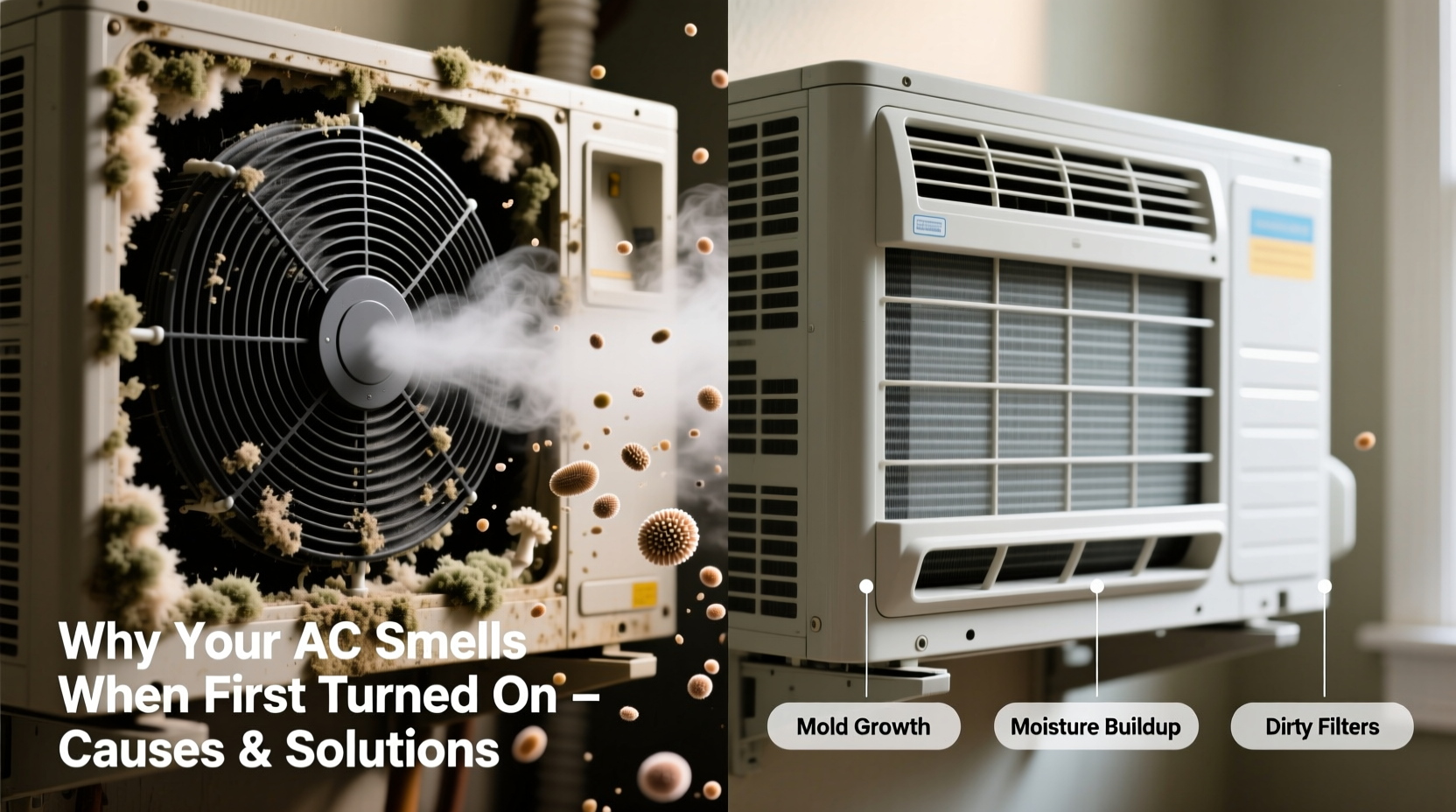Turning on your air conditioner after a period of inactivity—especially at the start of summer—should bring relief from heat, not a wave of unpleasant odor. Yet many homeowners are met with musty, sour, or even rotten smells the moment the AC kicks in. This isn’t normal, and more importantly, it’s not something to ignore. These odors often signal underlying issues within your HVAC system that can affect indoor air quality, system efficiency, and even health. Understanding why your AC smells when first turned on is the first step toward resolving the problem and restoring clean, fresh cooling.
Common Causes of AC Odors at Startup

When an air conditioner emits a strange smell upon startup, it’s typically due to biological growth, accumulated debris, or mechanical failure inside the unit. The most frequent culprits include:
- Mold and mildew buildup in the evaporator coil or drain pan.
- Bacteria and microbial growth in damp internal components.
- Clogged or dirty air filters trapping organic matter.
- Stagnant water in the condensate drain line promoting algae and slime.
- Dead animals or insects trapped in ductwork or the outdoor unit.
- Off-gassing from new components like insulation or lubricants (less common).
The reason these smells are most noticeable at startup is because contaminants have had time to accumulate during periods of non-use. When airflow resumes, spores, gases, and particles are pushed into your living space.
Mold and Mildew: The Most Frequent Offender
Mold and mildew thrive in dark, moist environments—conditions commonly found in an AC’s evaporator coil and drip pan. During operation, the coil cools humid air, causing moisture to condense and collect. If this water doesn’t drain properly or if the system remains inactive for weeks, standing moisture becomes a breeding ground for fungi.
Once the AC turns on, airflow forces mold spores into the ducts and throughout your home. The resulting smell is often described as musty, earthy, or similar to wet socks. In addition to being unpleasant, mold exposure can trigger allergies, asthma, and respiratory irritation—particularly in sensitive individuals.
“Persistent musty odors from HVAC systems are strong indicators of microbial contamination. Left untreated, they compromise both air quality and system performance.” — Dr. Lena Patel, Indoor Air Quality Specialist
Preventing mold requires consistent maintenance, proper drainage, and humidity control. Simply replacing filters won’t solve the issue if the source is deep within the coil or drain pan.
Step-by-Step Guide to Diagnose and Eliminate AC Smells
Follow this systematic approach to identify and resolve the root cause of your AC odor:
- Turn off the system immediately if the smell is strong or foul (e.g., rotten eggs), as this could indicate a gas leak or electrical fire risk.
- Inspect and replace the air filter. A clogged filter restricts airflow and traps moisture and organic debris, fostering bacterial growth.
- Check the condensate drain line for blockages. Use a wet/dry vacuum to clear algae or sludge buildup.
- Pour a cup of distilled white vinegar or bleach solution (1:1 with water) into the drain pan to kill mold and prevent future growth.
- Examine the evaporator coil (located indoors). If visibly dirty or coated in slime, professional cleaning may be required.
- Inspect ductwork and air handler for signs of rodent infestation or debris accumulation.
- Schedule a professional HVAC inspection if the odor persists after basic maintenance.
This process can eliminate up to 80% of common AC odors when performed consistently each season.
Do’s and Don’ts When Dealing with AC Odors
| Do’s | Don’ts |
|---|---|
| Replace filters every 1–3 months depending on usage and air quality. | Ignore persistent odors—they rarely go away on their own. |
| Clean the drain pan and flush the condensate line quarterly. | Use harsh chemical cleaners directly on coils without professional guidance. |
| Keep outdoor units clear of leaves, grass clippings, and debris. | Run the AC continuously with a known blockage in the drain line. |
| Install UV lights in the air handler to inhibit microbial growth. | Assume new-carpet-like smells are harmless; some off-gassing chemicals are volatile organic compounds (VOCs). |
| Use smart thermostats to run the fan periodically during off-seasons. | Delay repairs if you detect burning or oily smells—these may indicate electrical faults. |
Real Example: How One Homeowner Fixed a Musty AC Problem
Jamie R., a homeowner in Tampa, Florida, noticed a recurring musty smell every spring when she first turned on her AC. She replaced the filter but saw no improvement. After two seasons of discomfort, she called an HVAC technician who discovered a partially clogged condensate line and a thick biofilm coating the evaporator coil.
The technician flushed the drain line, applied a foaming coil cleaner, and installed a UV-C light near the coil to prevent regrowth. Jamie also began a seasonal maintenance routine: changing filters monthly during peak season and pouring vinegar down the drain access port every three months. Since then, her AC starts up odor-free and runs more efficiently, with lower energy bills.
Her experience underscores the importance of going beyond surface-level fixes and addressing the actual source of contamination.
Advanced Solutions for Long-Term Prevention
While basic cleaning helps, long-term prevention requires proactive upgrades and habits:
- UV Germicidal Lights: Installed inside the air handler, these lights emit ultraviolet radiation that kills mold, bacteria, and viruses on contact. They’re especially effective on coils and drain pans.
- Antimicrobial Coatings: Some HVAC systems come with hydrophilic or antimicrobial-treated coils that resist mold adhesion and improve drainage.
- Duct Sanitization: Professional duct cleaning with sanitizing agents removes built-up grime and neutralizes odors deep within the system.
- Smart Humidity Control: Pairing your AC with a whole-home dehumidifier keeps relative humidity below 60%, making the environment less hospitable to mold.
These solutions aren't just about eliminating smells—they enhance indoor air quality, extend equipment life, and reduce strain on your system.
Frequently Asked Questions
Why does my AC smell bad only the first time I turn it on?
During periods of inactivity, moisture accumulates in the evaporator coil and drain pan. Mold, mildew, and bacteria grow in this damp environment. When the system starts, airflow pushes these contaminants and their odors into your home. Once the system runs continuously, the smell may diminish—but the source remains unless cleaned.
Is a smelly AC dangerous?
It depends on the odor. Musty or mildew smells mainly affect comfort and air quality, potentially aggravating allergies. However, a rotten egg smell could indicate a gas leak, while a burning or metallic odor might signal overheating wires or a failing motor. In such cases, immediate shutdown and professional inspection are critical.
Can I clean the AC coils myself?
You can clean accessible parts like filters and drain pans safely. However, evaporator coils are delicate and often located inside sealed air handlers. DIY coil cleaning risks damaging fins or introducing excess moisture. For best results and safety, hire a licensed HVAC technician who uses specialized no-rinse foams and protective gear.
Essential AC Maintenance Checklist
Stay ahead of odors and breakdowns with this seasonal checklist:
- ✅ Replace or clean air filter (monthly in high-use months)
- ✅ Inspect and clear outdoor unit of debris
- ✅ Flush condensate drain line with vinegar or bleach solution
- ✅ Check drain pan for algae or standing water
- ✅ Listen for unusual noises (rattling, grinding, squealing)
- ✅ Verify thermostat settings and fan operation
- ✅ Schedule professional tune-up at least once per year
- ✅ Monitor for changes in airflow or cooling performance
Completing this list twice a year—before summer and after winter—can prevent 90% of common AC problems, including odors.
Conclusion: Breathe Easy Again
An air conditioner should cool your home without polluting the air you breathe. Strange smells at startup are not just annoyances—they’re warning signs that something inside your system needs attention. Whether it’s a simple filter change or a deeper microbial issue, taking action preserves your health, improves efficiency, and extends your HVAC system’s lifespan.
Don’t wait until the odor becomes unbearable or your energy bills spike. Implement regular maintenance, consider preventive technologies like UV lights, and consult professionals when needed. Your comfort and indoor air quality depend on it.









 浙公网安备
33010002000092号
浙公网安备
33010002000092号 浙B2-20120091-4
浙B2-20120091-4
Comments
No comments yet. Why don't you start the discussion?